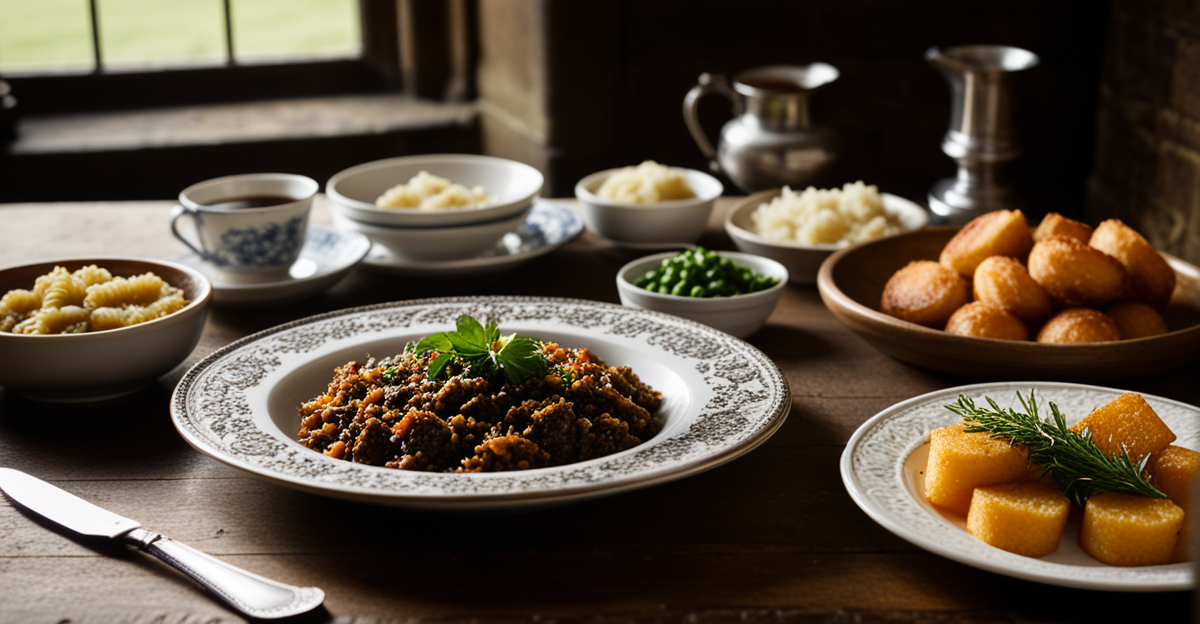Major Historical Events Influencing UK Cuisine
The historical events shaping UK culinary history are foundational to understanding traditional British food origins. Early invasions and settlements, such as those by Romans, Vikings, and Normans, profoundly impacted local diets and cooking techniques. Romans introduced sophisticated agricultural practices and new ingredients like grapes and olives, enriching the UK’s culinary repertoire. Vikings brought preserved foods and salt-curing methods, while Normans influenced baking and pastry traditions.
Later, the era of colonisation opened new avenues for global trade, making a variety of exotic ingredients accessible. The spice trade UK altered recipes by adding flavors like pepper, cinnamon, and cloves, which became staples in British kitchens. This period expanded the ingredient palette, incorporating spices, sugar, and tropical fruits into traditional dishes, transforming the British culinary landscape.
Have you seen this : How Can You Recreate Traditional UK Dishes with Modern Twists?
Additionally, the integration of these diverse influences facilitated the development of many classic UK dishes, demonstrating how historical events and global connectivity have continually shaped British food culture. This ongoing evolution highlights the dynamic nature of UK culinary history, rooted in centuries of cultural exchange and adaptation.
Major Historical Events Influencing UK Cuisine
Understanding UK culinary history requires recognizing the pivotal role of various historical events. Early food traditions were shaped significantly by invasions and settlements. For example, the arrival of the Romans introduced advanced agricultural methods and new foods like grapes and olives. Later, the Vikings and Normans brought with them different cooking techniques and ingredients, further enriching the culinary landscape.
Also read : How can you achieve the perfect texture for a homemade bread and butter pudding?
Colonisation and global trade also dramatically influenced the evolution of traditional British food origins. As the British Empire expanded, ingredients such as spices, sugar, tea, and exotic fruits were introduced into everyday cooking. This international exchange allowed British recipes to incorporate diverse flavours, transforming simple dishes into more complex creations.
Significantly, these events did not just add new foods; they altered eating habits and food preparation styles across the country. For instance, spices once only accessible through lengthy trade routes became integral to British kitchens, showcasing how global connections impacted local tastes.
This historical layering gives modern UK cuisine its dynamic character, rooted in centuries of cultural encounters and culinary adaptation. Recognizing these major historical events offers a clearer comprehension of how traditional British food origins continuously evolved.
Influential Peoples and Their Contributions
Delving into key figures shaping UK food history
The Romans significantly shaped early UK culinary history through advanced agricultural practices. They introduced methods such as crop rotation and irrigation, enhancing food production and variety. Their dietary staples included cereals, legumes, and fruits like grapes, fostering a more diverse and nutritionally rich food culture compared to pre-Roman times. Romans also brought food preservation techniques like pickling and salting.
The impact of the Vikings on British food history lies primarily in their introduction of preserved and salted fish, vital for long sea voyages and winter sustenance. Vikings favored simple yet hearty fare, using smoking and salt-curing methods that became part of UK culinary traditions.
Normans influenced baking and pastry techniques, introducing refined breads and richer pastries to traditional British food origins. Their impact is visible in dishes that emphasize elaborate preparation and presentation, contributing to the evolving tastes of medieval England.
Together, these groups not only introduced new ingredients and cooking methods but also fostered culinary integration, highlighting how migration and settlement events intertwined within UK food history to form a complex, layered cuisine.
Influential Peoples and Their Contributions
In UK food history, the contributions of the Romans, Vikings, and Normans were transformative, shaping early culinary practices and traditions. The Romans introduced advanced agricultural practices such as crop rotation and irrigation, which improved food production and variety. They also brought new foods like grapes, olives, and herbs, which enriched the traditional British food origins and elevated local diets.
The Vikings influenced UK culinary history by introducing preservation techniques, including salt-curing and smoking, essential for storing food during long voyages and harsh winters. These methods became staples in food preparation, expanding the diversity of ingredients available year-round. Furthermore, Viking cuisine emphasized hearty, robust meals using local meats and fish, which impacted rural diets.
Norman contributions included advancements in baking, notably the introduction of refined pastries and bread varieties. Their influence extended to game and meat cooking styles, including roasting and stewing, which became central to British feasts. The Normans also helped codify many culinary customs that persisted in traditional British food origins.
Together, these peoples embedded rich techniques and ingredients into the foundation of UK culinary history, blending their unique food cultures into the evolving British palate. This fusion set the stage for future transformations influenced by trade and colonisation.
The Role of Trade and Food Imports
Trade routes played a crucial role in shaping UK culinary history by introducing a variety of new foods that expanded traditional British food origins. Both maritime and overland routes connected the UK with distant lands, bringing exotic ingredients that British cooks eagerly incorporated into their recipes. The spice trade UK was particularly influential, delivering spices like pepper, cinnamon, nutmeg, and cloves which transformed the flavour profiles of many dishes.
Imported foods extended beyond spices to include tropical fruits such as pineapples and bananas, as well as vegetables like potatoes and tomatoes, which originated in the Americas. These additions enriched British diets and allowed for more diverse cooking options. For example, the potato became a staple in British households, fundamentally altering meals from the 18th century onward.
The integration of these foreign ingredients reflects a broader pattern of cultural exchange and adaptability in British cuisine. The spice trade UK connected British kitchens with global markets, making previously rare and expensive items familiar on everyday tables. Trade routes thus did not merely supply new foods but also influenced cooking techniques and eating habits, deeply embedding imported foods into the fabric of UK culinary traditions.









